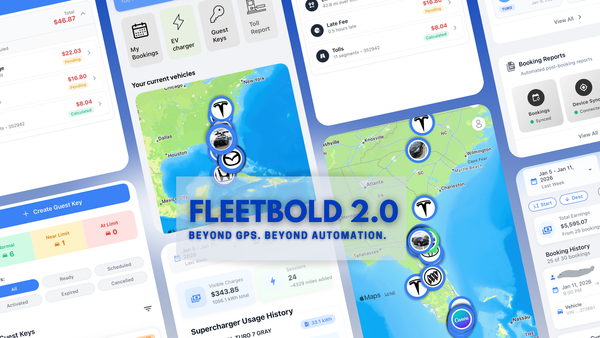What Are Turo’s Vehicle Requirements and How Do They Affect Your Earnings?
This blog explains why meeting vehicle requirements is crucial for hosts. From reducing insurance claims to attracting more guests and ensuring platform quality, following these guidelines can significantly boost your earnings.

Why Vehicle Requirements Matter
When you decide to list your vehicle for rent, it’s essential to understand that vehicle requirements are not just guidelines—they are vital to ensuring your success in the marketplace. Following the platform’s vehicle standards ensures that you are not only protecting your car but also your income and your reputation as a host. This blog takes an in-depth look at the importance of vehicle requirements, why they matter for both hosts and guests, and how following them leads to a more sustainable and profitable business.
Why Meeting Vehicle Requirements Is Crucial for Hosts
Protects Hosts from Claims
The importance of meeting vehicle requirements cannot be overstated, especially when it comes to protecting yourself from claims and legal issues. Insurance companies have strict criteria, and failing to meet those standards could result in disputes over claims. For example, if your car has a salvage title, even if it appears clean on paper, you might face insurance complications should an incident occur. Insurance claims are much more difficult to process when a vehicle does not meet the platform’s set standards, leaving you responsible for the damages.
Take a situation where a guest rents a car, and it suffers a mechanical failure due to lack of maintenance. If the vehicle was not regularly serviced or didn’t meet the required safety standards, the platform or the insurance company may deny coverage. This can leave you, the host, facing financial ruin because you didn’t take the time to ensure your vehicle met all the required standards. If your vehicle meets the set guidelines, you will have peace of mind knowing that your car is covered, minimizing the risk of facing unexpected financial responsibilities.
Ensuring your vehicle is well-maintained and falls within the necessary mileage limits also helps in avoiding other types of claims. If a car experiences a breakdown due to faulty parts, it could lead to negative feedback, cancellations, and even claims for compensation, which would hurt your bottom line. By taking the time to properly vet your vehicle, you can avoid potential insurance issues and keep your hosting business running smoothly.
Sets Guest Expectations
Another critical aspect of vehicle requirements is the effect they have on guest expectations. When guests are booking a car, they expect a certain level of service, safety, and dependability. Vehicles that meet the platform’s requirements—such as being in good mechanical condition, having a clean title, and staying within the required mileage range—are more likely to meet guest expectations.
Let’s say you list a vehicle that doesn’t meet the platform’s standards. Perhaps it has high mileage or a less-than-ideal maintenance history. This could lead to guests being less than thrilled with the car, and they might be quick to leave negative reviews. A car that doesn’t meet the standards may also experience mechanical failures or issues that leave the guest dissatisfied. For example, if a guest rents a vehicle and it breaks down due to faulty parts, the guest might leave a poor review, impacting your ability to rent the car again in the future.
Guests booking a car expect reliability and safety, and vehicles that comply with the platform’s requirements give them exactly that. This sets clear expectations for both the guest and the host and leads to better experiences all around. A well-maintained, reliable vehicle is more likely to get repeat bookings and positive reviews, which are crucial for long-term success. Hosts who ignore these standards may see their reputation suffer as a result of unsatisfied guests.
Maintains Platform Quality
The quality of the entire marketplace depends on hosts maintaining high standards for their vehicles. When all vehicles listed on a platform meet the necessary requirements, it enhances the overall trustworthiness of the marketplace. Guests feel more confident when booking a car that is verified to meet the platform’s safety and condition standards, leading to a better experience overall.
For example, if a guest were to rent a car that had an undetected salvage title, it could cause an incident during the rental. The guest could be unhappy with the experience, and the platform might receive negative feedback, which hurts the reputation of the marketplace. On the other hand, when hosts meet the vehicle requirements and provide clean, reliable cars, it upholds the integrity of the platform and builds trust with guests.
The platform’s success is reliant on its reputation for offering quality vehicles that guests can depend on. Hosts who adhere to the required vehicle standards contribute to a positive experience for everyone involved. When guests are happy with their rental, they are more likely to recommend the platform to others, increasing the chances of more bookings for you as a host.
Key Requirements for Listing
When listing your vehicle, there are several key requirements you must meet to ensure that your vehicle is eligible for rental. These requirements are set by the platform to ensure that all cars meet certain safety and reliability standards. Here’s a deeper look into each requirement.
Clean Title Status
One of the most important requirements for listing a vehicle is ensuring it has a clean title. A clean title means that the car has not been previously damaged or declared a total loss. A car with a salvage title could potentially be rejected by the platform, even if it looks fine on the surface. It’s crucial to check the vehicle’s history through a reliable report to ensure that it hasn’t been previously damaged, even if the current title appears clear.
A clean title guarantees that the vehicle has been inspected and deemed roadworthy by the authorities. Salvage or rebuilt titles may raise questions about the car’s reliability and safety. Therefore, listing a car with a clean title helps you avoid future issues with insurance claims, mechanical breakdowns, and guest satisfaction.
Mileage Limits
Vehicles listed on the platform are typically required to have less than 130,000 miles at the time of the first booking. Once your vehicle is listed, it can exceed this mileage limit and still remain active. However, it’s important to keep in mind that guests tend to prefer lower-mileage vehicles. Lower mileage generally means the car is in better mechanical condition and will perform reliably during the rental period.
Before listing your car, ensure that it meets the mileage requirements and document the mileage at the time of listing. By keeping track of your vehicle’s mileage and ensuring that it’s under the platform’s limit, you can avoid issues related to guest complaints about the vehicle’s performance.
Age and Condition
The age and condition of your vehicle are crucial to meeting platform standards. A car’s age impacts its safety features, mechanical reliability, and overall attractiveness to guests. Older cars may face more maintenance issues and could be less appealing to renters, especially if they lack modern safety features.
Regularly maintaining your vehicle is essential to ensuring it meets platform standards. For example, ensure the car is up-to-date on oil changes, brake checks, and tire rotations. A well-maintained vehicle is not only safer but more likely to pass the platform’s condition inspection, reducing the risk of cancellations or negative reviews from guests.
Market and Model Considerations
While all vehicles need to meet the platform’s core requirements, it’s also essential to consider local demand. Popular vehicle models differ by region, so understanding what works best in your area can help you maximize your bookings.
For example, a Toyota Tacoma may be in high demand in certain areas due to local terrain and driving conditions, while it may be less popular in urban areas where smaller cars are preferred. Research the local market to determine what models are most in-demand and align your vehicle list accordingly. If you own multiple vehicles, understanding the demand in your area can help you prioritize which ones to list.
Benefits of Complying with Requirements
Reduced Claims Risk
When you comply with the platform’s vehicle requirements, you greatly reduce the likelihood of facing issues with insurance claims. By maintaining a clean title, proper mileage, and good mechanical condition, your vehicle is more likely to be covered under the platform’s insurance policy. This reduces your risk of having to pay out-of-pocket for repairs or damage caused during a rental period.
Higher Guest Satisfaction
Vehicles that meet platform requirements are more likely to satisfy guests. Clean, reliable cars that run smoothly lead to better guest experiences, positive reviews, and more bookings. Happy guests are also more likely to return and recommend your car to others, boosting your rental business.
Sustainable Earnings
By meeting the platform’s requirements, you ensure that your vehicle stays listed for longer periods. Vehicles that meet the necessary guidelines tend to stay active and generate steady income. Regular maintenance and keeping your vehicle in good condition mean fewer breakdowns and a smoother rental experience, resulting in fewer cancellations and negative reviews.
Practical Tips for Meeting Vehicle Requirements
Check Your Title History
Before listing your vehicle, always check its title history to ensure that it hasn’t been involved in any accidents or declared a total loss. Using reliable car history reports will give you peace of mind knowing that your car is eligible for listing and won’t face issues later.
Verify Mileage Before Listing
Ensure that the mileage is accurate and falls within the platform’s acceptable range. Document the mileage with photos before the first rental to avoid discrepancies and ensure that your listing stays compliant.
Research Local Trends
Take the time to research the local market and see which models are popular in your area. By understanding what guests are looking for, you can make more informed decisions about which vehicles to list, increasing your chances of getting more bookings.
Prioritize Maintenance
Regular maintenance is key to keeping your vehicle in good condition. Perform routine checks, keep the car clean, and address any mechanical issues before they become major problems. A well-maintained vehicle is more attractive to guests and is less likely to experience breakdowns during the rental period.
Conclusion
Meeting vehicle requirements is essential for the success of your car rental business. By ensuring that your car has a clean title, falls within the mileage limits, and is in good condition, you protect your investment, increase guest satisfaction, and boost your chances of maintaining steady earnings. Adhering to these requirements not only ensures that you’re compliant with the platform but also helps build a trustworthy and reliable reputation, leading to more bookings and long-term success in the rental market.
FAQ
What are the key vehicle requirements for listing on the platform?
Key requirements include a clean title, mileage under 130,000 miles at first listing, good condition, and vehicles that meet the platform’s market demands.
How can I check if my vehicle is eligible for listing?
Use reliable car history reports to check the title status, verify the mileage, and ensure the vehicle is mechanically sound and meets safety standards.
What happens if my vehicle doesn’t meet the requirements?
If your vehicle doesn’t meet the requirements, it may be rejected or removed from the platform, and you could face issues with insurance claims or guest dissatisfaction.
How does compliance with vehicle requirements benefit hosts?
Compliance ensures a higher chance of successful bookings, reduces the risk of insurance claims, and leads to better guest reviews and sustainable income.
What maintenance should I perform to keep my vehicle in good condition?
Regular oil changes, tire rotations, brake checks, and other routine maintenance are essential to keeping your car running smoothly and meeting platform standards.





